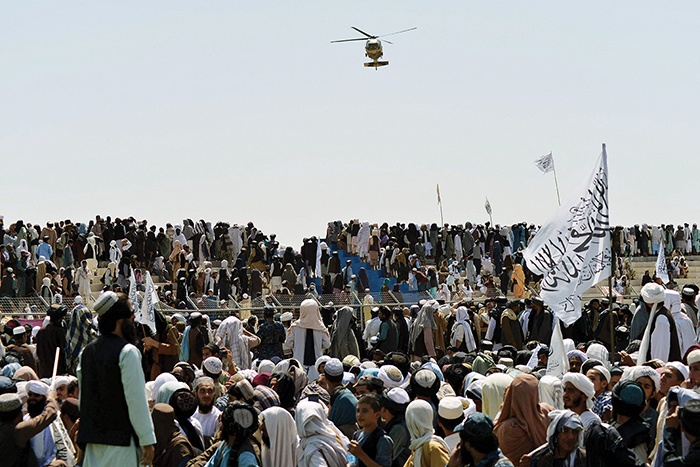KABUL: The Taleban yesterday paraded some of the military hardware they captured during their takeover of Afghanistan, hours after US President Joe Biden defended his decision to end the two-decade war. The Islamist hardliners are celebrating Monday’s final withdrawal of US troops as a historic victory after taking control of Afghanistan last month following an astonishing two-week offensive that capped a simmering 20-year insurgency.
Yesterday, a long line of green Humvees and armored fighting vehicles drove in single file along a highway outside Kandahar - the spiritual birthplace of the militant movement - many with white-and-black Taleban flags attached to aerials, an AFP journalist saw. In footage posted on a pro-Taleban account of the build-up to the parade, a helicopter flew overhead trailing the Taleban’s standard as fighters wrapped in headscarves waved beneath.
At least one Black Hawk helicopter has been seen flying over Kandahar in recent days, suggesting someone from the former Afghan army was at the controls as the Taleban lack pilots. The United Nations warned meanwhile of a looming "humanitarian catastrophe”, underscoring the daunting challenges that the Taleban face as they transform from insurgent group to governing power.
Biden was nonetheless defiant. "This is the right decision. A wise decision. And the best decision for America,” he said in an address to the nation. For the United States, Biden argued, the only choice was "leaving or escalating”. The president, who has been savaged by critics for his handling of the withdrawal which saw the US and its allies evacuate more than 122,000 in just over two weeks, hailed the operation as an "extraordinary success”. "No nation has ever done anything like it in all of history; only the United States had the capacity and the will and ability to do it,” he said.
All eyes will now turn to how the Taleban handle their first few days with sole authority over the country, with a sharp focus on whether they will allow free departure for those wanting to leave - including some foreigners. The United States has said that "under 200” of its citizens remain in the country, and Britain said the number of UK nationals inside was in the "low hundreds”.
Thousands of Afghans who worked with the US-backed government over the years and fear retribution still want to get out. Talks are ongoing on who will now run Kabul airport, which German Chancellor Angela Merkel warned was of "existential importance” as a lifeline for aid. A Qatar Airways flight landed in Kabul yesterday afternoon - the first since the United States departed - bringing a team of technical experts to work on fixing the trashed airport, a source close to the matter told AFP.
The goal was to resume flights for both humanitarian aid and to provide freedom of movement for those wanting to leave. Many Afghans are terrified of a repeat of the Taleban’s initial rule from 1996 to 2001, which was infamous for their treatment of women and girls, as well as a brutal justice system. The group has repeatedly promised a more tolerant brand of governance compared with their first stint in power.
Still, senior Taleban leader Sher Mohammad Abbas Stanikzai told BBC Pashto in an interview that while women could continue working, there "may not” be a place for them in the cabinet of any future government or any other top post. UN chief Antonio Guterres expressed his "grave concern at the deepening humanitarian and economic crisis in the country”, adding that basic services were at threat of collapsing "completely”. He pleaded for financial support from the international community for the war-ravaged country, which is dependent on foreign aid.
Authorities from several countries have already begun meeting with Taleban leadership, the latest being India. Qatar’s foreign minister, Sheikh Mohammed bin Abdulrahman Al-Thani, urged the Taleban to combat terrorism and called for an inclusive government. The US-led airlift began as the Taleban completed an astonishing rout of government forces around the country and took over the capital on Aug 15.
The withdrawal came just before the August 31 deadline set by Biden to end the war, which began with a US-led invasion that ousted the Taleban in the wake of 9/11, but later reached a stalemate on the battlefield with the resurgent militants. The conflict has claimed the lives of tens of thousands of Afghans and more than 2,400 American service members.
The evacuation was complicated by a threat from the regional offshoot of the Islamic State group, rivals of the Taleban. Thirteen US troops were among more than 100 people killed when an IS suicide bomber attacked the perimeter of the airport, where desperate Afghans had massed in the hope of boarding an evacuation flight. - AFP



